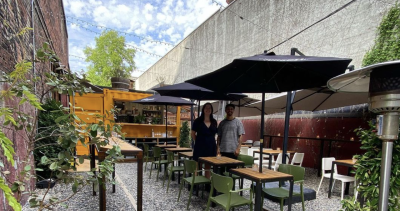What it was really like to compete on “Squid Game: The Challenge” from a Vancouverite who was there
By Darylle Johnson
Warning: This article contains spoilers from “Squid Game: The Challenge” season one.
I received the call just two days before Christmas 2022 that I’d be flying to London to film for Squid Game: The Challenge. An offshoot of the original Netflix-produced dystopian Korean drama about players facing crippling debt and competing to the death in childhood games, the reality TV version brought together 456 people to compete for $4.56 million.
Upon arrival, we were escorted individually to the a central London hotel, where we were isolated for several days with no phones, computers, or access to the outside world. We were not allowed to speak to other contestants. It was very immersive.
On the night before the first game, we were woken up around 3am and taken to Carlington Studios, the former Royal Air Force hangars. It was dark, cold, and eerie. We were not given much information and they fed us a small meal before putting on our squib packs (a prop used in movies and TV to emulate blood spurts from wounds). They didn’t tell us it was a pack that would explode, but when I looked at the strange black liquid in the straw-like tube, I could tell what it was.
After a few hours of waiting in dimly-lit, cold tents with one small heater for about 20 people, they lined us up in numerical order and brought us onto the set. Before we even began the competition, we were frozen with hurting feet. As brutal as it sounds, I loved every minute of it.
The first game was called Red Light Green Light (basically, a big doll sung a song in Korean for a few seconds, and we had to run towards the finish line; before the doll stopped singing, we had to freeze in place). I quickly realized that this was much more extreme than I had expected. With temperatures below freezing, and with only a thin jumpsuit on, some players were passing out, and many were losing feeling in their feet to the point that they could no longer move. The race to the finish line was not five minutes, like it showed on the clock. Instead, it continued for nearly 10 hours, with three to five seconds of sprinting and five to 20 minutes of holding one position (if we moved, we lost). When players passed out, nobody could move and help or they’d be eliminated, too. All we could do was shout for the medics.
One player admitted to me later that he urinated in his pants because there was no bathroom break. It’s wild what lengths people will go to for millions in prize money.
Still, I don’t believe producers were unreasonable or crossed any lines. For that much money, we knew this was going to be hard; we knew the risks, and we knew we were allowed to quit at any time.
After Red Light Green Light, we were brought back to the hotel around 1am without any food. Some people woke up to cold hamburgers outside of their doors; and others, like me, got nothing. After a couple hours of sleep, we were brought to the dorms, and that’s where the real fun began.
In this whole process I lost 12 pounds in six days; I heard about other people losing more. I slept about two hours per night (though the lights were out for eight), and could barely think straight after a couple of days. Our lips were chapped so much from the dry air that some peoples’ started to bleed. Some players used condoms on their lips to try to protect them. After a few days, we were issued some chapstick.
Many of the competitors were athletes, SWAT members, and military personnel, and I consistently heard them say that this was the hardest thing—both physically and mentally—that they had done in their life. The experience was not for everybody, but to me it felt like a true test of perseverance and a major character-builder. It made me push past my limits in ways I could not haveimagined; I came out of the experience stronger and more confident. I’d do it again 1,000 times over.
Back to the action, though: things really lit up when I reached episode three and was confronted with a life-sized game of Battleship.
It’s a luck-based game in which players guess coordinates and try to sink their opponent’s ships. As a game strategist and board game designer, I knew I’d have little control by sitting in a ship, so I volunteered to be the lieutenant and co-captain the mission. It was a risky move, because it meant increasing my chance of elimination to 50 per cent (the losing team’s captain sinks with their ships).
But I am extremely competitive and I’m not afraid of losing. I’d rather be in a position of control than a sitting duck, even if that means going out early.
The final outcome came down to one move. As for who won, well, you’ll just have to watch. Some things are still better seen on TV.
Darylle Johnson is a Vancouver-based board game designer.















Comments